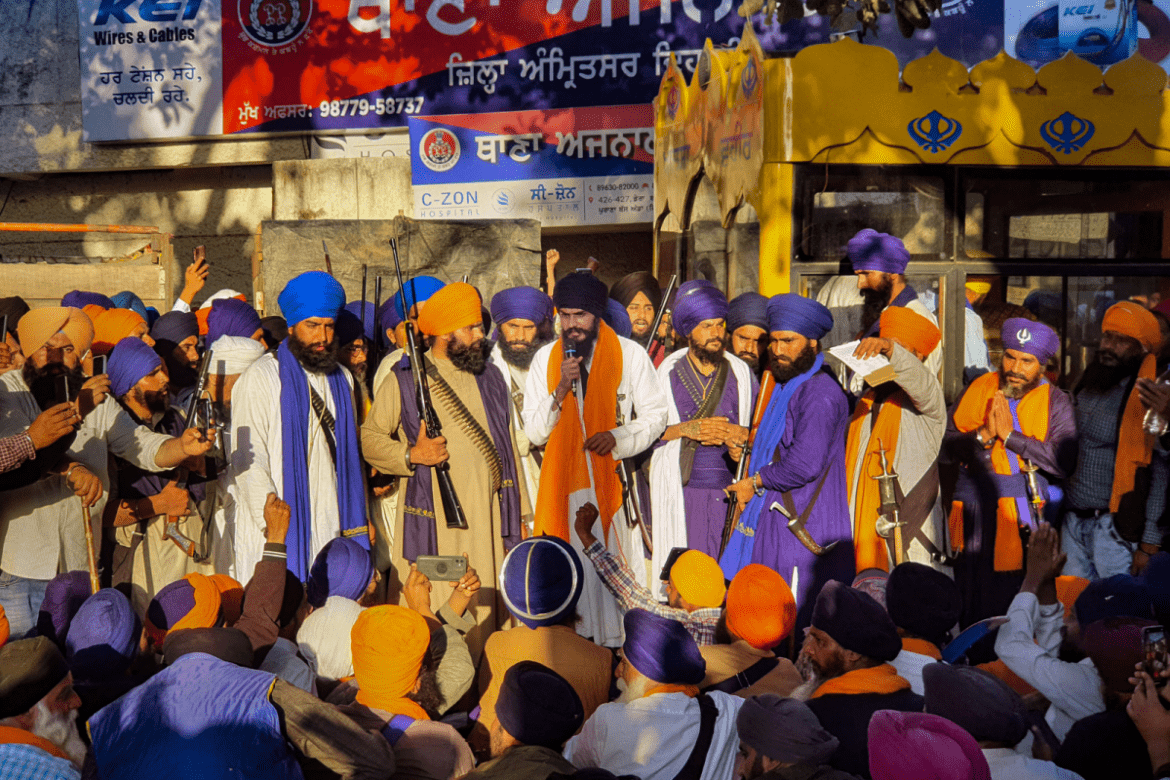AI Generated Summary
- He said the area on one side of the main hall, where chairs were placed for the elderly and disabled, was at a lower level compared to the rest of the floor of the hall so that the seats of chairs and the hall floor were at the same level.
- The police said Amritpal Singh, and his gang, used the holy Guru Granth Sahib as a shield to attack the police station, as they knew that the police would not want to be accused of sacrilege if something were to happen to the Granth Sahib in police action.
- Singh’s return to India and appointment as the new chief of Waris Punjab De marked a turning point in his life, as he began embracing a more orthodox Sikh lifestyle and promoting separatist ideas.
The recent arrest of Amritpal Singh, chief of the radical organization Waris Punjab De, by the Moga police has raised several questions about his motivations, methods, and beliefs. Singh’s journey from a non-orthodox life in Dubai to leading a separatist movement in Punjab highlights the volatile nature of the region’s politics and the consequences of such ideologies.
Amritpal Singh’s transformation began after the death of Deep Sidhu, the founder of Waris Punjab De, in a road accident in February 2022. Sidhu gained national attention when he unfurled the Nishan Sahib at the Red Fort during the farmers’ stir on January 26, 2021. Singh’s return to India and appointment as the new chief of Waris Punjab De marked a turning point in his life, as he began embracing a more orthodox Sikh lifestyle and promoting separatist ideas.
Singh’s rise to fame was swift but controversial. After assuming leadership of Waris Punjab De, he participated in the Amrit ceremony, dressed like Bhindranwale, and began advocating for a separate Sikh nation. While he claimed that his demands were non-violent, his actions spoke otherwise. On February 24, Singh and his armed followers stormed a police station to secure the release of his aide, Lovepreet Singh Toofan, injuring six policemen in the process. This brazen act put Singh in the national spotlight and drew the attention of law enforcement agencies. The police said Amritpal Singh, and his gang, used the holy Guru Granth Sahib as a shield to attack the police station, as they knew that the police would not want to be accused of sacrilege if something were to happen to the Granth Sahib in police action.

Following this incident, Punjab Chief Minister Bhagwant Mann said those who took the Sikh holy book Guru Granth Sahib to a police station as a shield cannot be called the ‘waris’ (heir) of Punjab.
On December 13, Sikh supporters of preacher Amritpal Singh Khalsa of ‘Waris Punjab De’ created a ruckus at the Gurudwara Singh Sabha, Model Town, Jalandhar. They broke the chairs and sofas, took them outside, and set them on fire. Gurdwara management committee president Ajit Singh Sethi on Tuesday said the sangat was perturbed and disturbed. He said the area on one side of the main hall, where chairs were placed for the elderly and disabled, was at a lower level compared to the rest of the floor of the hall so that the seats of chairs and the hall floor were at the same level. Both the gurdwara officials said that the way things were done also amounted to beadbi (sacrilege).
Amritpal Singh’s aggressive tactics ultimately led to his downfall. After the incident at the police station, the Punjab police launched a massive crackdown on Waris Punjab De members, arresting six of Singh’s associates on March 18. Though Singh managed to evade capture for over a month, the combined pressure from the Punjab police and the Central government forced him to surrender.
Amritpal Singh’s story underscores the dangers of radical ideologies and their potential to destabilize the fragile social fabric of Punjab. While some may argue that he was fighting for the rights of Punjab and its culture, the methods employed by him and his organization have done more harm than good. Moreover, it is essential to remember that Singh’s appointment as the chief of Waris Punjab De was not universally supported, with Deep Sidhu’s relatives distancing themselves from him and accusing him of spreading separatist propaganda.
As Punjab grapples with the aftermath of Amritpal Singh’s surrender, it is crucial for its citizens to reflect on the consequences of such radical ideologies and work together to promote unity, understanding, and respect for diverse perspectives. Only through open dialogue and peaceful cooperation can the people of Punjab foster a more harmonious and prosperous future for all.




